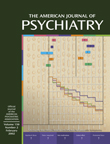Age at Onset, Childhood Psychopathology, and 2-Year Outcome in Psychotic Bipolar Disorder
Abstract
OBJECTIVE: The relationships of age at onset and childhood psychopathology to 2-year clinical and functional outcomes in first-admission patients with bipolar I disorder were examined. METHOD: Patients with bipolar I disorder (N=123) presenting with psychotic symptoms were followed over a 2-year period. Age at onset was stratified into <19 and ≥19 years. Childhood psychopathology was categorized as behavior problems, other psychopathology, and none. Functional and clinical outcomes were rated with standard measures. RESULTS: Childhood psychopathology and age at onset were independently related to poorer functional and clinical outcome. In the multivariate models that included psychopathology, age at onset, sex, and education, early age at onset was related to incomplete remission, and childhood psychopathology was related to functional outcome. CONCLUSIONS: Childhood psychopathology and age at onset contribute independently to outcomes of bipolar disorder. Childhood psychopathology is a much stronger predictor of functioning than age at onset.



